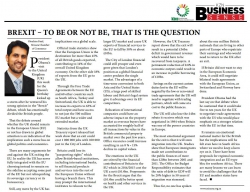Ebrahim Patel, Minara Chamber of Commerce; BREXIT - to be or not be, that is the question2016-04-29 President Obama's visit to the United Kingdom (UK) this week for the Queen's birthday kicked up a storm after he ventured his strong opinion in the "Brexit" debate, which has emotionally divided the British people.
That the debate around whether the UK should remain in the European Union (EU) or not has drawn in global attention is an indication of the implication such a move has on global politics and economics. There are many arguments for and against the UK exiting the EU. In reality the UK has never fully integrated with the EU choosing instead to remain on the sideline accepting some part of the EU but not relinquishing its sovereign currency or its bureaucracy. Still, any move by the UK has implications on a global scale. Official trade statistics show that the European Union is the destination for more than 45% of all British goods exported, contributing to 14% of the overall United Kingdom economy. On the other side 18% of exports from the EU go to the UK. Through the Free Trade Agreements between the EU and 60 other countries such as South Africa, Turkey and Switzerland, the UK is able to increase its exports to 63% of total output and have access to not just the 500 million EU market but a wider and extended market. Statistics from the UK Treasury report released last week show that an exit could cost 1 000 000 jobs with 100 000 just in the City of London. Britain could lose its "passporting rights" which allow British-based institutions, including international banks, to sell financial products and services into the rest of the European Union without having a branch there. This may prompt the international institutes to relocate to the larger EU market and cause UK exports of financial services to the EU to fall by 50% or about £10bn. The City of London financial could still prosper and even grow given that London's position as a global financial centre predates the single market. The advantages of a time-zone convenient to both Asia and the United States (US), a large pool of skilled labour and Britain's legal system give it advantage over its EU competitors. Relocation of international companies could have an adverse impact on the property market as overseas buyers have accounted for roughly half of all transactions by value in the British commercial property market over the past few years. Office vacancies could increase resulting in an 8 % - 15% decline in capital values. The emotions in the UK are stirred by the financial contribution of Britain to the EU which in 2014/2015 cost the UK a nett £10.4bn. Proponents for the Brexit argue that the £10.4bn could be better spent on health and other services in the UK. However, the UK Treasury report shows that the exit will result in a potential £36bn deficit in government revenue which would have to be recovered from taxpayers. A permanent reduction of 0.8% in economic output could result in an increase in public borrowing of £10bn. Savings on the current custom duties lost to the EU will be negated by the low or zero-rated trade agreements that the UK will need to negotiate with trading partners, which will come at a cost to the public finances. The UK will also lose the £4bn rebate it receives which was negotiated in 1984 when Britain was one of the poorer countries in Europe. The most emotional argument for the exit is that it will stem migration into the UK. Studies show that European immigrants made net contributions to the public finances of more than £20bn between 2001 and 2011. The Office for Budget Responsibility estimates that the ratio of debt to GDP will be 20% higher in 50 years if migration was stemmed. Thus far, no one has spoken about the one million British nationals that are living in other parts of Europe who repatriate their earnings and who would need to return to the UK after an exit. If Britain did not want to stay in the European Economic Area, it could still negotiate bilateral trade agreements with the European Union, as Switzerland and Norway have done. President Obama had the last say on that debate when he cautioned that it could take five to ten years for the UK to negotiate trade agreements with the US who would place emphasis on a stronger relation with the EU in that time. It remains an emotional national matter for the British but the implications will be felt even here in South Africa where we need to keep a keen eye on it. There have been proposals for regional economic integration and an EU-type bloc for southern Africa. There are many lessons we can learn to avoid the challenges that the EU and member states have faced. www.minara.org.za |
Ebrahim Patel, Minara Chamber of Commerce; BREXIT - to be or not be, that is the question
Copyright © 2024 KwaZulu-Natal Top Business
